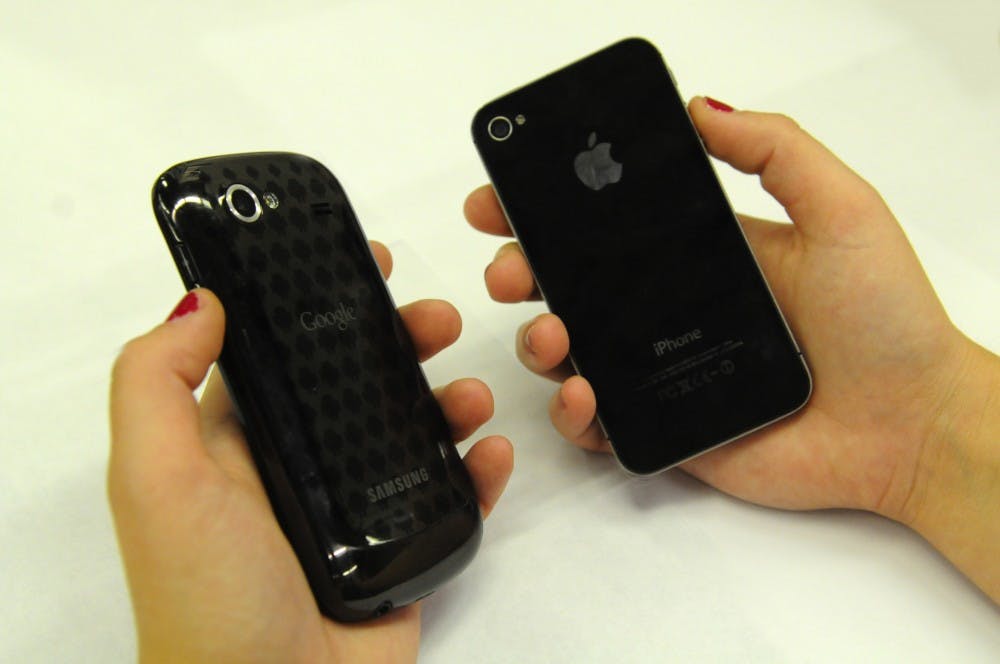
Smartphone market giants Apple and Samsung were involved in a lawsuit, in which jurors awarded Apple $1.05 billion in damages.
Credit: Justin CohenPenn professors are speculating what the smartphone market will look like after Apple’s recent lawsuit and its upcoming iPhone release.
The lighter, thinner iPhone 5 was announced on Sept. 12, and will be available in the United States on Sept. 21. This was just a little less than a month after Apple won $1.05 billion in damages in a tech lawsuit.
On Aug. 24, nine jurors awarded the tech giant $1.05 billion in damages after ruling that Samsung infringed on six Apple patents.
The infringed patents include: document enlargement by tapping the screen, the iPhone icons’ rounded rectangle shape of the icons and the distinction between single and multi-touch sensitivity.
Samsung also claimed five instances of patent infringement, though their accusations centered on hardware rather than design. The company’s allegations that Apple copied its method of data packaging and transmission, amid other claims, were determined invalid.
“I think what’s going to happen is it’s going to be a very protractive battle that’s not going to help either one of them in the long run,” marketing professor David Bell said. “Whenever there’s a lot of antagonism there’s a lot of room for irrational behavior that is harmful to everybody,” he added.
Michael Sinkinson, business economics and public policy professor, said the verdict will result in more creativity within the industry. “I think for the market overall, you’re going to see more distinct design, which is a good thing,” he said. “It’s chilling in one sense because you’re going to have companies patenting everything under the sun going forward.”
According to marketing professor Jonah Berger, the suit may be more beneficial to Samsung than the verdict suggests. “It basically says Samsung’s products are just like Apple’s and they’re cheaper,” Berger said. “If people thought the generic version did the same thing … people would be more inclined to buy the cheaper version.”
By targeting Samsung, many of whose products use the Android platform, some say Apple is attempting to make an indirect blow to Google. According to a Nielsen study, Android phones accounted for 51.8 percent of the smartphone market as of June 2012, as compared to Apple’s 34.3 percent.
“The problem with suing Google is Google gives their Android software away for free so there aren’t a lot of revenues to recover if you’re Apple,” Sinkinson said. “However, it’s very easy to go before a jury and say, ‘This phone that Samsung made looks a lot like this phone that we made, and they made a lot of money off this phone, so we’ve been injured.’”
The lawsuit had little, if any, bearing on iPhone 5 sales. According to AT&T, the iPhone 5 is the fastest-selling iPhone the company has offered. On the first day of sales, there were 2 million pre-orders — more than double the amount sold by the previous model.
The phone was made available for pre-order at midnight PST on Sept. 14. The new model boasts a taller display screen, a smaller camera and a new operating system.
College sophomore Ryan Miller has already preordered the phone and said the phone will make preparing for class easier.
“For me, it all came down to the seamless combination of so many unique yet necessary functions being bundled into an even better handset than its predecessor,” he said in an email.
He added that he will use it to read news articles for class and use the calendar app to view his schedule on the bigger screen.
“To their credit, they have very well-designed devices,” Sinkinson said of Apple. “That appeals to a huge number of consumers, even if [many] of their changes are more evolutionary than revolutionary.”
Bell said that much of Apple’s success can be credited to their image. “People associate the use of those products with more creative people than business people,” he said. “I think the other reason people used to love Apple is because they were the little guy getting beat up by Microsoft. Ironically, now Apple is the big guy.”
The Daily Pennsylvanian is an independent, student-run newspaper. Please consider making a donation to support the coverage that shapes the University. Your generosity ensures a future of strong journalism at Penn.
DonatePlease note All comments are eligible for publication in The Daily Pennsylvanian.




